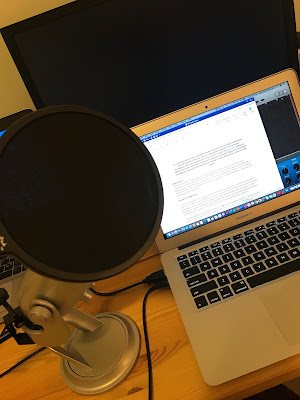Five Tips for Writing a Podcast Script
Wednesday, March 25, 2020
Podcasting is all the rage, and it didn’t take me long to quickly become addicted to the medium. I’ve discussed my desire to create my own true crime podcast here before, and this past summer, I finally started putting a plan into place. Having found myself with extra time on my hands due to the current state of the world amid Covid-19, I’ve begun working on the podcast production in earnest.
While there are many different components to creating and producing a podcast, today I’m going to focus on the topic of scriptwriting. Here a few tips I’ve learned along the way about writing a podcast script.
Develop a format. I feel like formats are important for the main episodes of a podcast, so the listener always knows what to expect. This format can vary from time to time, such as with bonus episodes, but I find myself drawn to podcasts where I know what the introduction will include, especially if it has catchy music. But that may just be my personal preference.
My podcast is a true crime podcast about missing people, so I decided on a short introductory paragraph that briefly describes the case, followed by the intro, and then the overview of the case.
Write in sound effects and audio instructions. Because I want to add sound effects to break up the sound of my voice, I write in where I want certain types of sounds (dog barking, someone knocking on a door, a car crash, etc.) If I’m also going to use audio from another source, such as a TV news segment, I paste the hyperlink right into the script, along with how far in I want to pull the audio, so I can easily find it when going into the editing phase.
Create a call to action. This part has evolved as I’ve written a few different episodes, but right now I ask listeners to rate and subscribe to the podcast, visit my website, and check out the sponsor. I also provide a teaser sentence that lets everyone know where the next episode’s case will be from geographically.
Read the script out loud a few times before recording. I didn’t do this enough before I jumped the gun and started recording my first episode. I found myself stumbling over certain words and phrases and ended up revising the script as I paused the recording. If you read the script out loud first, chances are more likely that you’ll find those problem areas that need tweaking before production begins.
Compile any extra information in each episode’s document for show notes. Show notes can be included directly in the episode information when the podcast is uploaded to iTunes, Stitcher, or wherever you listen to podcasts. This can include any of your sponsor offers or codes, products you might be launching, additional links to information about the episode, etc. My plan is to have a page on the podcast website with a running list of the episodes. On that page, I can paste the script directly from my notes for anyone who doesn’t like to listen to podcasts, and then have the audio link also included in the same post. Because I get information from a variety of news sources, I’ll include a reading list on that page for anyone who wants to take a deeper dive into the case. Plus, you never know what kinds of bonus content you can pull from just one script!
Have you ever written a podcast episode, or follow a podcast that has scripts you love? I’d love to know more!
Renee Roberson is an award-winning writer, magazine editor, true crime addict and wannabe podcaster. Follow her at FinishedPages.com.
Powered by Blogger.







4 comments:
Hi Renee,
I've only recently started really listening to podcasts. Like you, I like to know what to expect in terms of format. We do the same thing when we write books in series after all.
Also I prefer the ones that are about 30 minutes long. Most of the hour long podcasts I've sampled start with 10 or so minutes of chatter. Nope. I came here to hear about writing/horseshoe crabs/knitting.
I had to record an audition video of me reading an essay. You definitely discover phrases that are tricky when you read things aloud.
Good luck on your podcast! I'm waiting to listen to true crime until you get yours "on the air."
--SueBE
I'm excited that you started working on this!! Great tips!
These are fantastic tips, Renee! I love sound effects, and that's a smart idea to add them into your script. I heard the clip you posted in our BKer group and it sounds incredible. Your voice is perfect for a podcast! I can't wait until you finish one. :)
I was reading Sue's comment, and I used to prefer half hour ones, but now I actually prefer hour-long podcasts, which is perfect for walking. Right now since the parks and trails are all closed, I'm walking around my pool in the backyard, and podcasts are saving me from the boredom!
Is the big black round thing on your Yeti Blue a pop filter? What kind is it?
Renee--I have only listened to a couple of podcasts (S-Town and Ear Hustle) but when yours comes out, I know I will be an avid listener.
I'm with Angela. If I am going to listen, a 30-minute one just allows me to get into it, and then it's over--too soon.
Good luck. I can't wait (but I guess I have to ;).
Post a Comment